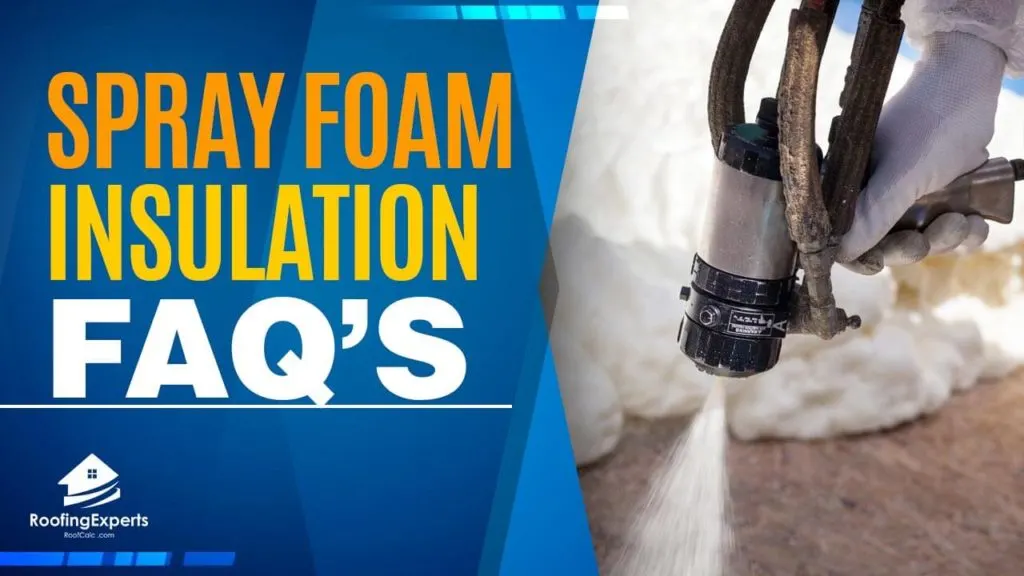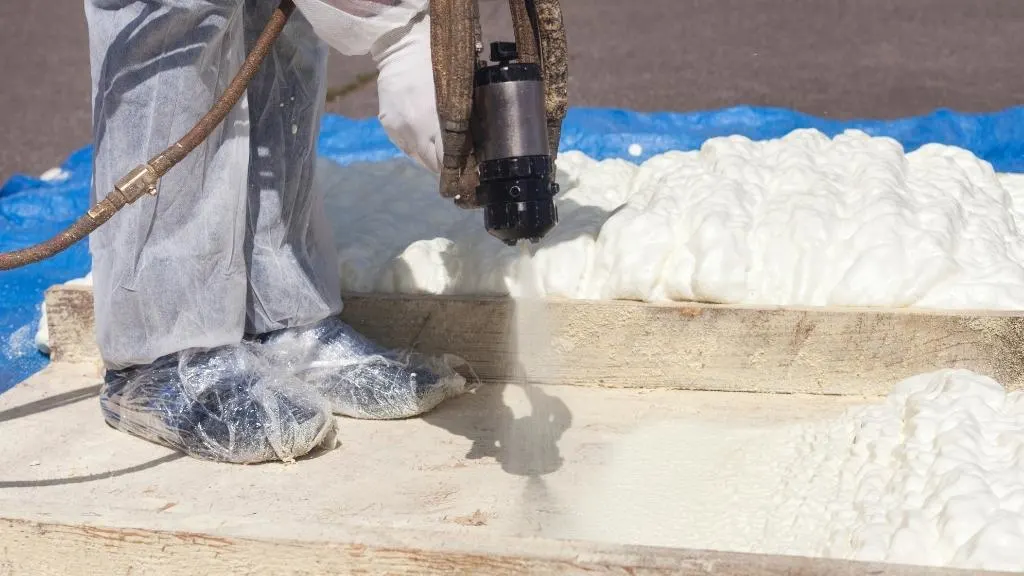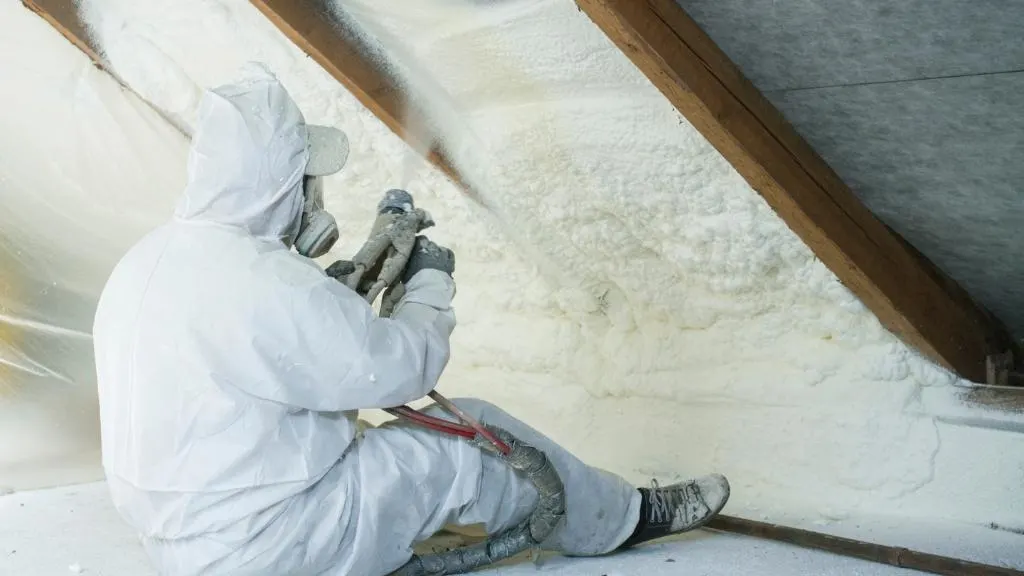
Spray foam insulation is the best choice for insulation. It’s eco-friendly, it has a long life span, and it’s perfect for any home or business that needs to be insulated.
This blog post will teach you how spray foam insulation works, why it’s better than other types of insulation, and more!
What is Spray Foam Insulation?
Spray polyurethane foam (SPF) is a spray-applied plastic that has many different uses and can be found in buildings all across the country. This product not only insulates your home but also seals cracks or gaps making energy efficiency much more attainable!
Spray foam insulation is a type of insulation that is applied as a liquid and then hardens to form an insulating foam. It is sprayed onto surfaces, such as walls, ceilings, and floors, to create an airtight seal and to help improve energy efficiency.
How Does Spray Foam Insulation Work?
The way spray foam insulation works is by trapping air in small bubbles. These tiny bubbles create an insulating barrier that helps keep your home comfortable and can save you money on your energy bills.
Benefits of Spray Foam Insulation
There are many benefits to using spray foam insulation, including:
- A tighter seal that helps keep out drafts and other elements that can contribute to poor indoor air quality.
- An improved energy efficiency, which could mean your home requires less energy for heating and cooling.
- A thicker insulation barrier than other products on the market. This means more comfort throughout your home!
However, there are some minor disadvantages to using spray foam insulation as well:
- Spray foam insulation can be messy to install and may require professional installation.
- If there is ever a water leak in your home, the foam insulation could potentially absorb the water and become damaged.
How Much Does Spray Foam Insulation Cost?
Spray foam insulation typically costs $0.44 – $1.5 per board foot, but sometimes you may find it cheaper or more expensive depending on the size of the project!
What are the Best Applications for Spray Foam Insulation?
Spray foam insulation works best in closed spaces where it can prevent air from escaping through the walls. This product can be used on roofs, attics, crawlspaces, and even floors!
It is important to note that spray foam insulation should not be used in areas where there is constant moisture, such as basements.
Is Spray Foam Insulation Safe?
Yes, spray foam insulation is safe to use in your home! It is made from polyurethane, which is a material that has been used for many years in a variety of applications.
If you are unsure about whether or not this product is right for you, be sure to consult a professional! They will be able to help you determine if spray foam insulation is the best option for your home and can provide you with an estimate for installation.

How Can a Spray Foam Help Your Roof?
The right insulation can help you maintain the temperature of your home no matter what the weather outside is like. As insulation gets colder, it becomes more resistant to heat flow, which helps your roof stay warm in the winter and cool during the summer!
This product not only provides comfort to your walls, but it can also help you save money! The average homeowner spends a lot each year on heating and cooling. With the right insulation, you could cut down your energy bills by up to 20%!
Spray foam insulation differs from traditional fiberglass or cellulose insulation because it is able to seal off even the smallest leaks in your home. This means that spray foam insulation can help reduce indoor air pollution and also help prevent drafts!
Related Article: Roof Insulation: Different Options Explained
Types of Spray Foam Insulation
There are three types of spray foam insulation: open-cell, closed-cell, and low-density.
Open-cell Spray Foam
Open-cell spray foam is made up of tiny cells that are not completely closed. This makes the foamless dense and airier than other types of insulation. It is also cheaper to install. However, open-cell spray foam has a lower R-value than other types of insulation and is not as effective at preventing heat loss.
Open-cell spray foam is best used in applications where the insulation will be exposed to the air, such as in attics and crawl spaces.
Closed-Cell Spray Foam
Closed-cell spray foam is made up of cells that are completely closed to one another. This makes the foam denser and prevents air from passing through it. It also keeps heat inside the building, making it ideal for weatherization. While more expensive than other types of insulation, it is extremely effective at reducing heat loss.
Closed-cell spray foam can be used anywhere in a home but is most commonly used as exterior insulation.
Low-density Spray Foam
Low-density spray foam is made up of cells that are not completely closed, but denser than open-cell spray foam. It has a higher R-value and lowers vapor permeability than other types of insulation. Low-density spray foam can be used anywhere in a home but is most commonly used as exterior insulation.
What is Icynene Spray Foam?
Icynene spray foam insulation is filled with tiny open cells that are 95% air. As a result, it expands 100 times faster than typical two-pound open-cell spray foams and has better low-temperature characteristics. It also has unique thermal properties that allow it to maintain an open, breathable structure.
Unlike typical water-blown closed-cell spray foams, Icynene foam insulation is a low-density spray foam insulation, which means it has a lower R-value. However, Icynene spray foam insulation still offers excellent thermal performance and air sealing properties.
How to Use Icynene Spray Foam Insulation
Icynene spray foam insulation is sprayed onto rigid polyurethane developed for home insulation products and open-cell foam insulation. Icynene foam insulation is then cured with thermal energy, which causes the foam to expand and fill all the voids and cracks in the surface.
FAQs on Spray Foam Insulation for Roofing
-How long will my spray foam roof insulation last?
Icynene spray foam has a lifespan of up to 50 years. The life of your spray foam roof insulation will depend on the climate and environment in which it is installed, as well as the type of foam used.
-Can I install spray foam insulation myself?
Most types of spray foam insulation can be installed by a homeowner, but it is always best to consult with a professional. Icynene spray foam is more challenging to install and should only be done by a qualified professional.
-What are the benefits of using spray foam roof insulation?
Spray foam roof insulation offers a number of benefits, including reducing energy costs, increasing comfort, and extending the life of your roof. Icynene spray foam also offers unique thermal properties that help it maintain an open structure.
-Can I install spray foam insulation over my existing roof?
In most cases, you can install spray foam insulation over your existing roof. However, this should always be done with a professional. Icynene spray foam is more challenging to install and should only be done by a qualified professional.
-Can I use closed cell insulation on my roof?
While it may seem like an easy way to save money, using low-quality open-cell plastic insulation only creates problems for homeowners. It does not last and it will need to be replaced every few years, which adds significant cost that is avoided by using spray foam roof insulation in the first place.
-How do I know when my spray foam needs repair?
It can sometimes take a while for a homeowner to realize their spray foam has failed, as there are often no symptoms until the insulation has completely deteriorated. The best way to know if your spray foam needs repairs are by having it inspected after several years of installation.
Conclusion
With all this information about spray foam insulation, you should now have a better understanding of what this type of insulation is and how it can benefit your home.


